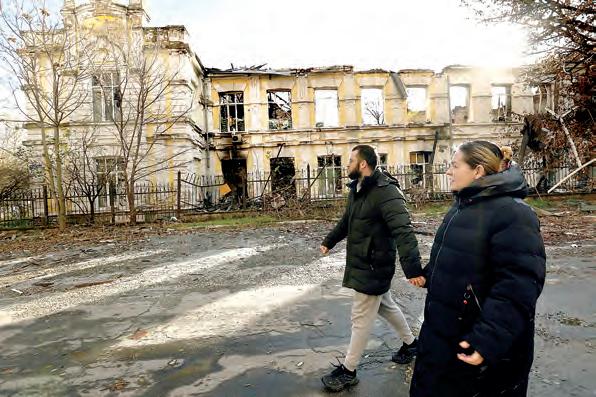
5 minute read
Classifieds
0343 ROOMS FOR RENT
$725 mo. + $300 dep. Shared utils. cable incld. Male prefd. N/S. 707-514-8150.
0811 SUVS - 4WD
2003 Chevy Tahoe LT. All pwr., lthr., clean, v8, 5.3 L, 183k mi. Clean title & smog. $ 6,900 obo DLR #42203. (707)2806816 Quinterosautosales.com
0827 HONDA
2009 Piolet EX-L. A/T, v-6, all pwr., lthr., DVD Nav., moonroof. 121k mi. 2wd. $10,900 obo D LR #42203 . (707)280-6816 Quinterosautosales.com 2014 Accord Sports. A/T, all pwr., great on gas, 4 cyl., 126k. New oil, tires, etc. $13,900 obo. DLR #42203. (707)280-6816 Quinterosautosales.com

Lovers
From Page 4
to get food,” Taranov said. “When you saw a Russian soldier, you are shaking inside.”
The Ukrainians on the street were older, and children stayed home. “It was like 10 years passed” in 10 months, she said.
At the start of the war, when it was still possible to leave, many of Taranov’s friends fled elsewhere in Europe. Slava wanted to leave as well.
“I told him he could go,” Taranov said, but she was staying.
Slava was quick to react. “Are you insane?” he asked. “I’m not going without you.”
During the first couple of months of their relationship, it was difficult to meet in person with Russian troops patrolling the streets. They strip-searched the men, Slava said, looking for signs of Ukrainian military service, questioning them repeatedly: Why do you have long hair? Why do you have a beard?
“If they didn’t like your answers, they’d put you in detention,” he said.
Every time he left her home, Taranov wondered if he’d be coming back.
Slava, who is also 31, was living in a less affluent area of Kherson where Russian was the predominant language. He said that the local policemen fled when the Russians arrived, so he helped organize a civil defense group in his neighborhood. About 230 men took turns patrolling the area and answering a temporary hotline.
Slava was familiar with law enforcement; he’d been a policeman before going into online gaming. But, with a master’s degree in computer science, Slava saw a brighter future in tech, and Taranov plans to join him in his egaming business.
After the war started, his sister left for Poland and was seeking asylum in Canada. He never really knew his father, and his mother was staying with friends in Estonia. But now he had Taranov, and the large house – with the thick windows, the bathroom filled with buckets of water, and the Russians down the street – became his home as well.
Taranov’s mother took to Slava right away, and it was quickly apparent that when it comes to talking to Larisa, he had an easier time than Taranov did. He even tried to open her eyes to the atrocities committed by Russian troops.
At first, Taranov said, her mother resisted. Larisa believed what the Russian news channels were saying. “It was Russian propaganda TV, 24/7,” Taranov said. “That’s all Mother watched.”
And Larisa “didn’t believe the news about Bucha,” a town under Russian occupation where hundreds of people were massacred early in the war.
The Russians cut off all Ukrainian cellphone service and “forced us to get Russian phone numbers. I used my dead grandmother’s ID to get a Russian SIM card,” Taranov said. “That way they wouldn’t know my name.”
But Slava had connections to get an encrypted internet line through his business, and they were soon seeing the news reported from a Ukrainian perspective. Nonetheless, it took more than six months to convince Larisa that Russian troops were committing atrocities.
“The Russians were saying it was all fake, that nothing happened there, just actors and Ukrainian journalists making it up,” Taranov said. “She changed her mind when she saw what happened in Kherson. She realized everything that happened in Bucha was true.”


Carolyn Cole/Los Angeles Times/TNS photos Viacheslav Slavov takes the bus across town to his neighborhood, where he has helped set up a community watch with other men to prevent theft and to assist those in need.
Ludmila Taranov, left, and Viacheslav Slavov take a walk after Kherson’s liberation, passing a building previously used by Russian forces. Viacheslav Slavov, left, and Ludmila Taranov walk to downtown Kherson to get a cellphone connection so that she can send a message to her father, who is on a ship in Australia.
n n n
It’s tough to make plans in a war zone, but Taranov dreams of starting an art therapy program for children. “I used to teach children with learning disabilities,” she said. “I think a lot of children have been affected by the war. I want to open an art gallery for them.”
In the meantime, she and Slava are expecting a child of their own, whom they will name Mary.
“I’m lucky I didn’t get pregnant sooner,” Taranov said. “The Russians forced all [newborns] to be Russian citizens.”
“We didn’t want to be a Russian couple,” so they didn’t get married under the Russian occupation, “but we will as soon as the Ukrainian government offices reopen in Kherson.”
That may be awhile; the Russians, who withdrew from Kherson last month, have started to bomb the city from across the Dnieper River. There were “more than 50 bombings already today,” Taranov said in a recent text. “They bomb different neighborhoods. Already, 10 people are dead and seven are injured, including kids.”
She felt the baby kicking while she was making tea. “I try to stay as calm as possible, even if there is street fighting going on,” she said, adding: “We can’t leave now with the bumpy roads, and mines. It’s not safe for the baby.”
But after a month of constant bombing in Kherson, Taranov says she and Slava will leave for Kyiv immediately. Mary is due in January, and Taranov was advised that there are no good doctors left in the city for the delivery.
“We remain optimistic and are making plans for the future,” Taranov said. “I just hope my baby will not face war.”



